We are getting close to what might be called The Noah Scenario. Last month was the wettest January in Britain since records began in 1767. So far this month has been no different, and the Met Office expects the wind and rain to continue until March. Climate change may be a gradual process, but people who live on the Somerset Levels or the banks of the Thames are getting a very sudden education in the value of arks.
It's unlikely that these floods will be the last such catastrophe, or the worst. Climate scientists expect bigger and more frequent extreme weather events throughout the coming century – not just wind and rain, but droughts as well. Nor is weather the only danger: pandemic flu, nuclear weapons, antibiotic resistance, environmental catastrophe and chronic food shortages could also offer dire threats to civilisation as we know it. You might not want to panic just yet, but you might decide that it is time to join the "preppers" – people who are secretly preparing to abandon modern life when the apocalypse, in whatever form, does arrive.
When do I abandon my home?
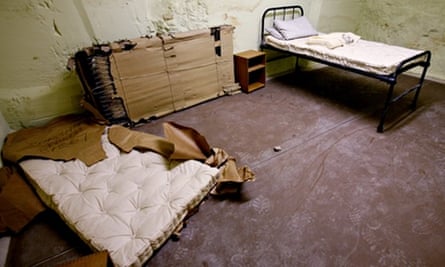
When you have no choice. When soldiers are on your street, your neighbours have begun to steal from you and plague-sufferers are camped in your drive – or perhaps slightly before all that. Preppers have a catch-all term for this moment: the SHTF scenario, in reference to the day when the Shit finally does Hit The Fan.
"It would be the last resort for me," says Steve, a 57-year-old prepper from Essex, who runs ukpreppersguide.co.uk. "Some people seem to think it's the first thing to do. The moment something happens, they grab their rucksack and off they go and live in the wild – but if you've ever tried that, it really isn't easy. Where I am at the moment, I probably have enough provisions to survive for about nine months. That doesn't include going out and getting your own food."
When the moment comes, however, you may not have much warning, so it is important to keep what preppers call a "bug-out bag" ready at all times. Ideally, you'd leave at night, when you won't be followed. "The idea behind leaving your home is to get away from danger," Steve explains, "which means getting away from everybody and going under the radar, off-grid, so you can't be found – then just survive for however long is needed before you can come back to civilisation."
Should I move to Cumbria?
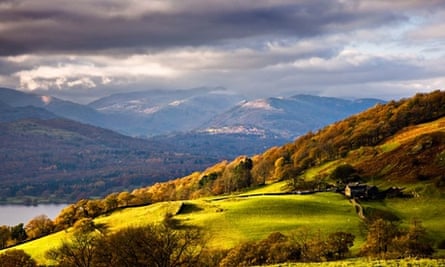
If you're worried about rain, Suffolk is Britain's driest county. But there you'll have to worry about the sea instead. Next driest is Bedfordshire, although it is also quite an expensive place to buy a house, while society still functions, so Nottinghamshire or Northamptonshire might be better if you're surviving on a budget. Be sure to have plenty of water butts in any of these places.
Alternatively, it might be simpler to live somewhere wet, but higher up. Each outbreak of catastrophic flooding brings with it a quieter outbreak of people feeling smug on hills, which never flood, and offer a good defensive position should you come under attack from hordes of wet, hungry or diseased people. Cumbria, Wales and the Western Highlands are some of the wettest parts of the UK. They are also very hilly, not too expensive, and reasonably remote from population centres, which makes them perfect for your purposes.
A quick word on the windiness of hills. This can be a good thing, allowing you to generate your own electricity if you put up a turbine. If you are worried about storm damage, however, then you will want to give thought to exactly where your house should be. "Our prevailing weather comes from the west," explains Nicola Maxey from the Met Office, "so if you're on the east side of a hill you're going to be protected from the prevailing winds." Thus located, with several months of food, electricity and water-purification supplies, your house should be a good place to wait for calamity to pass.
What should I take?
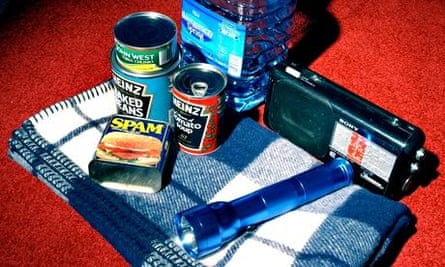
This is the most-discussed question of all among preppers, and you'll find many packing lists for bug-out bags online. Water, fire and light, hunting and survival tools, food and cooking equipment, medical supplies, maps, communications, clothing, shelter, weaponry, miscellaneous useful items and the bag itself are the major categories for consideration, which should give you an idea of how much you have to buy, pack and think about. As always, the trade-off is between having all the equipment you need and being able to carry it. If you're going alone, that makes things harder, although a group is harder to feed.
"Any bug-out bag should be equipped with at least seven days' food in the form of MREs – that's dehydrated Meals Ready to Eat," says Steve. "It's a bit like Pot Noodles, but on a more advanced level. It's very easy to take a week's supply. But along with that you're going to need methods to trap and snare animals, and potentially to shoot them. We're not allowed many firearms in this country, but even a basic catapult will help."
You'll also have to consider secrecy, which, after all, is the whole point of the exercise. For instance, you should avoid lighting fires to cook your food because they will make you visible. Instead, you are better off taking a small alcohol stove. When it comes to what you'll live in, caves are good. The trouble is there aren't enough of them, so you'll need to bring a tent, and learn to camouflage it. Over time you may want to build a larger and more comfortable shelter around that, although it is also an advantage to stay mobile.
The luxury option would be to to buy one of the many decommissioned bomb shelters or observation posts that come on to the market from time to time, or perhaps just your own bit of tunnel. Some, such as the Dartmoor observation post that sold for £17,400 in September 2012, are little more than a buried cupboard. Others, such as the Burlington Bunker in Wiltshire, are vast complexes capable of housing several thousand people. That went on sale in 2005, and was probably out of your price range. Having bought a bunker, it will of course need to be stocked up with several months' supplies, and perhaps its own bug-out bag in case you have to leave. Don't forget some boardgames and a psychiatrist.
Will I have to live in the woods?
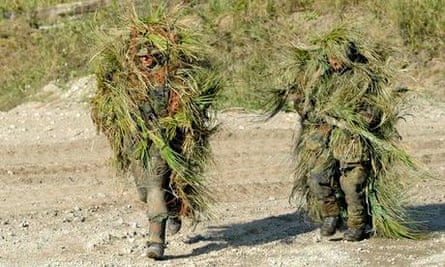
Think carefully about where to go, and give yourself several options. You'll need a piece of land – perhaps only a few acres – where you can hide and find enough to eat and drink. In the UK, it is difficult to hide in open country, so woodland is good. "Anywhere that's secluded, that's probably the key to survival," Steve says. "Get as far away from people as possible, and stay there. Don't make yourself known. I've got two areas I go to that are less than five acres. Two forests absolutely full of wildlife, with a stream running along. If you can get near a river, you can fish."
Another thing to bear in mind is the time of year. In the winter, food may well be scarce and water more abundant; in the summer, the reverse, so you may want to prepare an option for each season. You also need to consider how you'll get there. One location may be perfect, but if you're relying on petrol and roads, in the SHTF scenario it may be inaccessible. Give yourself at least one location you can walk to.
As practice for keeping themselves hidden, or just for the buzz, some people engage in an activity called "stealth camping". Essentially this means sneaking into places they are not allowed to be, staying the night and leaving again without ever being detected. If you've bought your own bunker, obviously you don't need to bother with this. Just make sure the hatch is strong, and that you can get there.
Could I disembowel a rabbit?

Getting the equipment and supplies is one thing, but being ready to use them is another. Steve regularly visits his planned bugging-out locations without any food or water, and practises living off the land for several days. "It really is surprising what a culture shock it is to go away for a week with nothing," he says. "It's not a jolly. A lot of people are armchair preppers. They'll get the equipment and they'll read the book, but they won't go out and practise. But that really is the key to being prepared – making sure you can do what you think you can do."
Can you, for instance, shoot a rabbit, skin it, field-dress (ie disembowel) it, and cook it, perhaps in the rain, with just a pocket knife? Can you set traps for fish? Do you even know what wildlife is in your chosen area, which offers the most meat, and which is easiest to catch? Do you know how to tell whether or not water is safe to drink? If you make yourself ill by doing any of these things wrongly, are you medically skilled enough to treat yourself? Can you mend your clothes, or your radio, or your tent? Most of these skills are not difficult to master, they just need "practice, practice, practice", according to Steve.
Should I take my family (and could I eat them)?

This is tricky, because even starting the conversation is a point of no return. "One of the key elements is not telling anyone that you're a prepper," Steve says, which is why he won't share his surname. "If every man and his dog knew, and then if there was a disaster, they'd all just say: 'Don't worry. We'll go round there. Steve's got it all.'"
On the other hand, survival is much easier in a group. You can carry more, and do more. What's important, however, is that everybody shares your vision and is equally dedicated, so the team does not disintegrate. "You don't want any hangers-on," says Steve. "Someone who is skilled medically is a big plus. Someone who's mechanically minded, someone who can cook and hunt and fish – several people with different skills is ideal."
So who can you trust? If you can trust your family, take them, but perhaps make a contingency plan for which one you'll all eat first, and discuss it in secret with the others. (You might also make another plan about who'll be eaten second, and discuss this with whoever's left. If no one discusses eating anyone with you, distrust them all.) If your family includes any young children you are not prepared to eat then your chances of success are more or less zero, but you're probably accustomed to that feeling.
Remember that shared planning as a group also means shared practice. Each person should focus on their special skills, but make sure that everybody is on top of the basics. "I drag my wife with me sometimes," Steve says. "She doesn't necessarily like it, but off we go. She doesn't mind eating a nice bit of fresh rabbit, but she certainly doesn't like the idea of skinning it or anything like that."
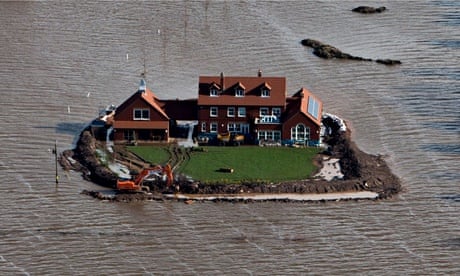
Comments (…)
Sign in or create your Guardian account to join the discussion